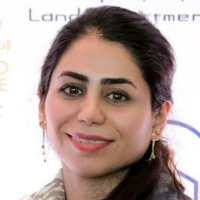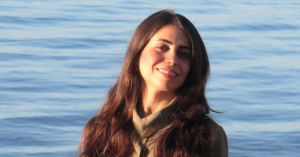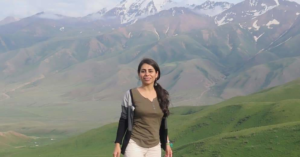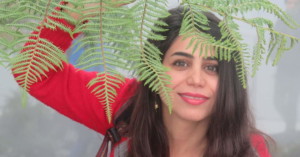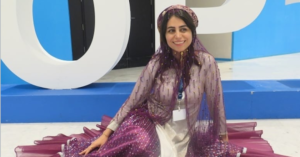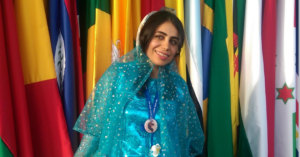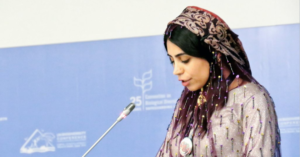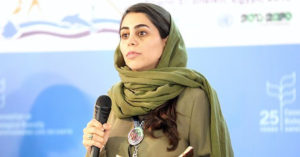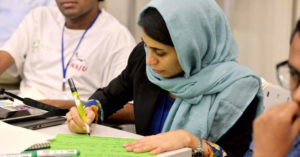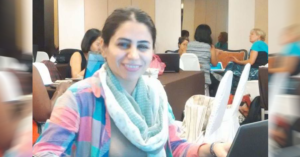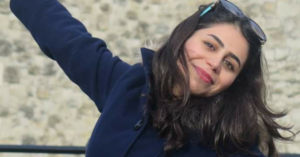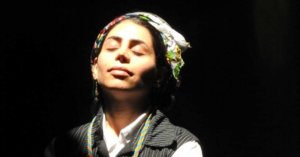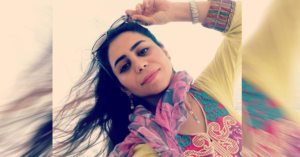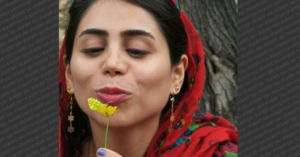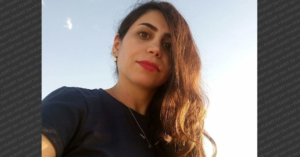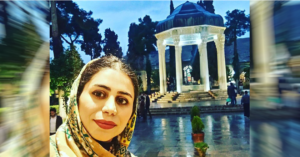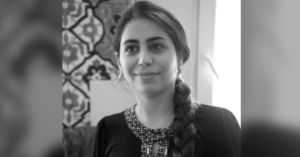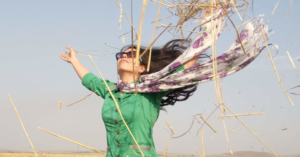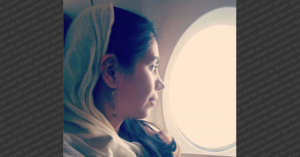Ghanimat Azhdari
You’ll Be Forever Alive
My dear Ghanimat!
Months have passed since those two damned missiles. I have taken all our family photos out from under the glass of my desk. You were in there, winking. I collapsed every time I looked at them.
There is still no belief in me, no power in my brain, no ink in my pen to write for you. But I pick up my shaking pen and I write for you nonetheless. If I can’t do justice to the glory of your existence, forgive me. My body shakes, my eyes don’t see. No! I don’t dare to say your name, to look at your picture. But I feel a burden as heavy as Damavand on my shoulders. I have to write it and to make it happen. Maybe then, I can calm down.
I want to write,
By my pen won’t.
I want to write of love,
But no love is left.
I want a poem about you,
But my lips don’t speak.
I love you,
But I can’t speak.
After you, I want to still walk,
But I can’t.
It was at the height of the war that she first entered this cursed land: a land torn between the missiles of the enemy overhead and the ghastly shadow of the boots of tyranny on the ground. They called the war jihad, God’s path, but they had their own goals. They the war would bear fruit for all those who had waged jihad for Islam, but we almost lost our own territory. We gave so much blood, fought so hard to liberate Khorramshahr, the City of Blood. They could have finished the war but for their own interests, and to strengthen the basis of their own power, they used our youth as cannon fodder and kept it going.
Of all those imaginary fruits of war (ghanimat, as we call them in Persian) our family received just one: a girl who my father accordingly called Ghanimat.
Later, this cursed land was once again shedding its own youth. In the skies, they targeted her. They pulled the trigger, so unfairly. They threw cold water on the hot fire of her dreams. Yes, the jihadists on the path of God couldn’t let us have this one Ghanimat. They cruelly took her away from us.
She flew! Yes, she had come to fly. She was from a family of teachers, members of the Qashai clan whose ambitions and dreams had helped them conquer the Dena and Zardkooh mountains, so as to go beyond the great Damavand, now setting Toronto in their sights, now to conquer Canada’s best universities.
Ghanimat was a girl small in physique but tall in ambition. That was why her Canadian professor called her “The Fireworks.”
With her childhood and teenage years behind her, after high school was done, Ghanimat studied natural engineering at Ahvaz’s Jundi-shapur University. How happy she was there! How motivated. How active. How friendly with her classmates.
After Ghanimat got her engineering degree, she was determined to continue studying and entered into the MA program at Tehran University. We left Shiraz together in order for her to register in the capital. There, we arrived at the beautiful Karaj campus: quiet, fringed with tall trees. I glanced up and commented on how tall the trees were.
“Just like my dreams,” she said. “You can’t see where they end up.” I asked her not to be over-ambitious, to calm down, to take steps slowly, one by one. “No, one must go and reach one’s goals,” she said.
She had her goals and dreams, and all I had was missing her. But we were both happy. She, because she was moving toward her goals. I, because she was happy.
She got her MA, with all the difficulties and time away from home that entailed. But her ambitions didn’t stop there. Though she didn’t have a lot of wealth, it seemed, she could have endless dreams; she could fly high with her imagination alone. Now she was aiming for a bigger goal: a PhD at Tehran University, which she applied successfully for and came third in the national examination. But despite this, her place was abruptly given to someone else to meet a quota.
Ghanimat was briefly stopped in her tracks. But she didn’t stop. Through her own work and without any nepotistic connections to exploit, she found a part-time job teaching at Azad University. This didn’t satisfy her, so she found a job in Tehran’s international environment institution. Maybe this was what she had been looking for: somewhere she could pursue her love of working with nature; to be loved by its pleasant scent. Yes, she was a lover, a lover of life; a lover of beauty; a lover of breathing in the flora, fauna and atmosphere of her land.
Ghanimat was a branch of olives and a tree of palm. Her heart was filled with the pleasant smell of jungle trees. She loved the chestnuts of the Zagros Mountains. A girl the color of fire, the shape of wind. She was short but never came short in effort. Her happy eyes took life in easily, and she held up a mirror to life. From her words and in her dress sense, the Qashqai dialect bloomed like a palm in the desert. She hated unfairness and bowed to kindness. Ghanimat loved beauty and freedom. She wanted contentment, not only for humans but for all living things on earth.
Now in the Kavir-e-Lut, then in the grass fields of Turkmen Sahra; now in the Siahkal Jungle, then in the dry steppe of Chabahar; now with the rich men of Tehran province, then with the poor kids. Now in a conference in North Africa, then in a UN Meeting, trying to get funding for conservation and to defend the rights of the nomads. Now in Europe, then in South America. She never stopped, and continued working and researching, always full of love for her land.
This still wasn’t enough for Ghanimat. She wanted to fly. She couldn’t stay on earth. She was filled with movement and passion.
When we were together she talked constantly about her job and her conferences. How much we talked about politics! She defended the vote she had given to President Hassan Rouhani. I was opposed to it. She didn’t know that the very man she had voted for would shamelessly see her burned in the sky.
One day she wrote me an email, saying that Canadian university had accepted her for a PhD. She spoke of how happy she was to be working under a professor – and the professor had said she was proud to have a student like her. She also had an offer from China but she chose Canada.
A few days before Ghanimat went Canada, we gathered the family together for a trip to Turkey. Like always she was full of movement and passion, and she brought energy to us all. This wasn’t a surprise. She came from a father who was a man of letters and spoke sweet, beautiful words. These were our good times, which we enjoyed beyond words. Alas, alas, this also turned out to be our last meeting. It was over too soon.
Everybody went on their way. Ghanimat went to Canada and began her new life in the midst of snow and bitter cold and new life challenges. Just three months in, she opted to come to her homeland for the new year holidays.
I was against it; I tried hard to dissuade her. I told her that our land was burning in the fire of tyranny, autocracy and lust for power and it may burn her too. It won’t, she said. I told her to hang back because it was dangerous. She didn’t accept this.
Maybe something was drawing her back, I don’t know. Maybe she had to march toward her destiny. Maybe she wasn’t an earthling at all and simply had to join the heavens. She had come to life amid a war for their interests; she would soon return to heaven in another war, once more in their interests.
On the day of her flight, she called my father and said, in her usual sweet tones, “Baba beine shame pavraze varame (Daddy, I have a flight tonight).” With a kindly paternal smile, her father laughed and said: “Baba jaan, san hamishe pavraz vaari (My child, you always have a flight).” But we didn’t know that this would be a flight like no other; that this wasn’t going to be a flight in which the passengers clapped as the pilot landed.
Oh, my father, how did you bear such news, as heavy as mountains, as deep as oceans? No one has ever borne such news.
Yes, she lived happily, but she died a bitter death. News of her death filled the whole world. What eyes… their tears, in grief for Ghanimat, wetted his face wet and they never dried. In her wake, Ney, the Persian flute, music and gut-wrenching songs gave everything a mystical quality. The pedlars of religion were nowhere to be seen.
Ghanimat! I am sad that you left. You didn’t listen to what I said, and you left me. But you are my friend like always. Friends get friends upset too sometimes, but this is quickly forgotten. Those shameless men took you and all your kindness from us. They left us alone with our grief at your absence. For what sin are we being punished like this?
After you, I am exhausted
Like a broken ship.
I breathe,
But I am dead inside.
You are gone and I don’t have you
But I still want you.
I am sitting here without a sound
I have given up life.
My heart is heavy because you left
I am mad at the world
Your name is Ghanimat (precious gains)
Your memory is a Ghanimat
These devils hit you in the sky to further their own goals. But the part-achieved goals of your life will be pursued by other students. Your books and research will be continued and they will get to the finishing line. Your enemies wanted your name to disappear, but the humanitarians on the other side of the globe have already dedicated a scholarship in your name. You are eternal. For as long as humanity survives, your legacy will survive too. Your name will shine on the facades of Guelph University, Canada and students will write your name on the final page of their doctoral dissertations. Your path will be eternal.
My dear, be calm and sleep in peace. We are all by your side. You will be forever and ever alive.
Writer: Ahoora Azhdari, Ghanimat’s Brother
Translator: Arash Azizi
Editor: Hannah Somerville
With the support of iranwire.com
